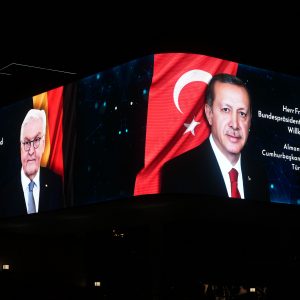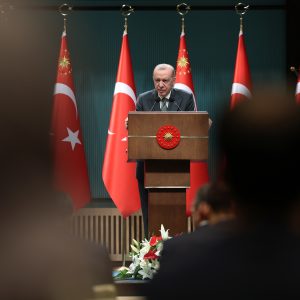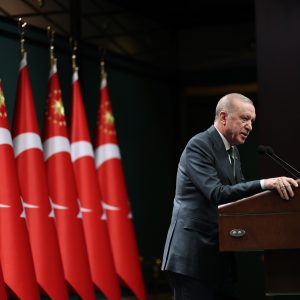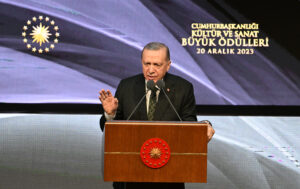No accountability, no justice: Rohingya embrace ICC warrant sought for Burmese junta chief
DHAKA, Bangladesh (AA) — Rohingya refugees in Bangladeshi camps have expressed support for the International Criminal Court (ICC) prosecutor’s decision to seek an arrest warrant for Burma’s military leader over crimes committed against their community.
The chief prosecutor of the ICC, Karim Khan, had on Wednesday filed for an arrest warrant against Burma’s army chief Gen. Min Aung Hlaing, citing his alleged role in crimes against humanity targeting the Rohingya Muslim community .
These include deportation and persecution of the Rohingya Muslims in Burma and Bangladesh between August 25 and December 31, 2017.
According to the ICC, the violent campaign forced over a million Rohingya Muslims to flee Burma, with most seeking refuge in neighboring Bangladesh.
The move marks a significant step in the pursuit of accountability for atrocities committed by the Burmese junta.
Rohingya leaders and refugees in Bangladesh’s camps said they are glad that the application for such a “high-profile” arrest warrant has brought their struggle back into global focus.
“We support this arrest warrant wholeheartedly,” said Nur Hashim, a Rohingya leader in the camps, speaking to the media.
“It was the Myanmar military that conducted genocide against us. The evidence of their crimes is clear. Unless they are held accountable, justice will remain elusive for us.”
Saiful Islam, 34, a refugee in Kutupalong camp, recounted his harrowing escape from Burma in 2017, at the height of the genocidal killing spree targeting the vulnerable Muslim minority.
“My brother was killed before my eyes by the Myanmar army. We fled to save our lives,” he said. Despite the trauma, Islam expressed a longing to return to his homeland in Rakhine State.
“We don’t want to live as refugees anymore. It’s not a life of dignity. But we need assurances that the military won’t persecute us again.”
– ‘A step towards justice’ –
Calling the arrest “significant,” Khalilur Rahman, the high representative of Rohingya affairs of the Bangladesh interim government, had told the media that this was “a step towards ensuring justice and accountability.”
On Wednesday, interim government chief Muhammad Yunus met ICC prosecutor Khan in the capital Dhaka, reiterating his call for the establishment of a UN-guaranteed safe zone inside Myanmar’s Rakhine State.
Yunus emphasized that such a zone could provide immediate relief to displaced people and facilitate their eventual return. “When the fighting stops, those in the safe zone can safely go back to their localities,” he said.
International affairs experts view the ICC arrest warrant request for Hlaing as a pivotal development in addressing the Rohingya crisis.
“This sends a strong message to abusive military actors involved in the genocidal campaign against the Rohingyas,” said Shahab Enam Khan, a professor of international relations at Jahangirnagar University near Dhaka.
He noted that this also serves as a warning to rebel groups causing violence against Muslim Rakhine civilians, who have been targets of a long campaign of hate.
“The ICC has made it clear that Myanmar is not above the law and cannot escape accountability,” Khan added.
He emphasized that an ICC warrant restricts the accused individual’s international mobility, as ICC member states — currently numbering 124 — are obligated to arrest them if they travel to their jurisdictions.
– Struggle must continue –
Delwar Hossain, director of the East Asia Center at Dhaka University, highlighted the possible warrant’s potential to refocus global attention on the Rohingya crisis.
“With the world preoccupied by the Ukraine-Russia war and the Palestine conflict, the Rohingya issue had become a footnote. This arrest warrant puts it back on the radar to some extent,” he said.
However, experts agree that while the arrest warrant is a significant step toward accountability, the struggle for justice and rights for the Rohingya must continue.
UK-based Burmese academic Maung Zarni, co-founder of the Free Rohingya Coalition, stressed the need for a broader approach to addressing crimes against humanity.
“Holding a handful of Myanmar generals accountable, even if they are imprisoned, is not sufficient justice for the Rohingya people,” he said.
Zarni argued that genuine justice would require restoring the Rohingyas’ right to their homeland.
“Rohingyas need land where they are free from subjugation, constant racist domination, and the violent Islamophobia perpetuated by Myanmar’s military and ethno-nationalist Rakhine Buddhists,” he said.












